|
|
|
Sort Order |
|
|
|
Items / Page
|
|
|
|
|
|
|
| Srl | Item |
| 1 |
ID:
186833
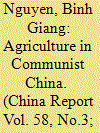

|
|
|
|
|
| Summary/Abstract |
This article examines the Communist Party of China’s (CPC) policies toward agriculture from an institutional perspective. Mao Zedong viewed the peasantry as allies of the CPC, and in order to socialise rural areas, he ordered massive collectivisation, attempting to manage the countryside and peasants with people’s communes and production brigades. Deng Xiaoping and Jiang Zemin responded to the dysfunction that followed with reforms and opening up, including the abolition of collectives and people’s communes, liberalising agriculture, and promoting incentives for labour. This led to its own complications, and efforts later by Hu Jintao and Xi Jinping have been directed towards resolving the ‘three rural issues’ – of agriculture, rural areas, and farmers – in order to achieve a ‘moderately prosperous society’ and the ‘great rejuvenation of the Chinese nation’. This article argues that while there is an emphasis on innovative policies and approaches, there is a lack of structural reforms owing to the CPC’s wish to remain in control of rural areas and peasant life.
|
|
|
|
|
|
|
|
|
|
|
|
|
|
|
|
| 2 |
ID:
178277
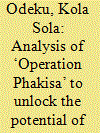

|
|
|
|
|
| Summary/Abstract |
South Africa is endowed with vast ocean resources and wealth which have the potential to provide enormous socio-economic goods and services to the people and create massive economic growth and wealth if vigorously explored and tapped. This assertion is made against the backdrop of the recent government strategical initiative, under the auspices of ‘Operation Phakisa’, to unlock and explore the full potential of the ocean’s wealth to drive economic growth, create jobs and alleviate poverty. This paper seeks to accentuate that the Operation Phakisa initiative has the potential to strategically unlock underexplored ocean resources for purposes of creating sustainable economic growth, development, and alleviation of hunger and poverty. It concludes that effective and sustainable use of the ocean’s wealth depends on good, efficient governance policies, practices and management. Methodically, a qualitative non-empirical research approach was adopted and utilized in this study by sourcing, drawing upon and using information and insights from contemporary literature to address identified problems.
|
|
|
|
|
|
|
|
|
|
|
|
|
|
|
|
| 3 |
ID:
191158


|
|
|
|
|
| Summary/Abstract |
Do households sell assets in order to smooth consumption? The empirical evidence is mixed. Using household- and village-level data in the context of China's poverty alleviation policy, we analyze the relationship between climate shocks and household coping behaviors from the perspective of whether coping strategies to deal with weather shocks are sensitive to the contiguity of destitute areas. Our results indicate that, unlike households living in noncontiguous destitute areas, households struck by weather shocks in contiguous destitute areas tended not to reduce or liquidate assets. To overcome weather shocks, households in contiguous destitute areas instead reduced household consumption, such as food consumption and increased nonfarm working hours. Our findings point to the possibility that the implicit assumption of consumption smoothing coupled with a failure to incorporate explicitly the factor of contiguous regions has led to seemingly divergent findings in the literature regarding consumption smoothing.
|
|
|
|
|
|
|
|
|
|
|
|
|
|
|
|
| 4 |
ID:
193219


|
|
|
|
|
| Summary/Abstract |
In 2020, hundreds of sub-national government officials and Chinese Communist Party cadres undertook a months-long experiment in livestreaming and social commerce. These sectors are among the most dynamic in the Chinese internet economy and culture, yet Chinese officials have generally resisted engaging with popular and celebrity cultures, even as institutions have begun to expand and modernize their digital operations. Why, then, did a substantial cohort of local officials undertake this experiment? The proximate reason was that they wanted to help local producers hit by the pandemic and to meet their own pending poverty alleviation targets. However, the significance of the case is broader, reflecting the central state and Party's revised thinking on political communications in an era of internet celebrity and self-media and the propensity for local officials to innovate and experiment in the field of digital and popular communication. Investigating empirically how and how effectively livestreaming was employed at the local level helps us to illuminate these dynamics. To facilitate the study, we investigated how officials understood and performed internet celebrity through in-person semi-structured interviews and a three-month virtual ethnographic study.
|
|
|
|
|
|
|
|
|
|
|
|
|
|
|
|
| 5 |
ID:
176889
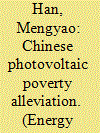

|
|
|
|
|
| Summary/Abstract |
As a part of an environmentally concerned development strategy, the photovoltaic poverty alleviation in China is adopted to lift households above the rural extreme poverty line by the end of 2020. With the detailed project-level data in 534 counties, 22 provinces, this systematic assessment on Chinese photovoltaic power projects identifies geographic distribution, economic benefits and emission mitigation for deployment distribution and policy implications. Overall, the photovoltaic installed capacity has reached 5213.37 MW, with the income generation of 7.41 billion CNY per year and the carbon emission mitigation of 5.98 million tons. From the results in this work, it is obvious that the GDP and household savings per capita in most counties and cities are lower than in those without photovoltaic poverty alleviation stations. As an essential strategy of generating income and mitigating emissions especially in countries well-endowed with sunlight, the deployment of photovoltaic power projects is consistent with sustainable development goals relating to global poverty eradication. With the assessments on the photovoltaic power stations, the initial implementation of photovoltaic poverty alleviation revealed a number of problems and solutions, which are practical for systematic deployment and policy implications of relevant photovoltaic power projects worldwide.
|
|
|
|
|
|
|
|
|
|
|
|
|
|
|
|
| 6 |
ID:
192866


|
|
|
|
|
| Summary/Abstract |
This paper argues that in China’s Xinjiang Uyghur Autonomous Region, work placements of re-education detainees and Xinjiang’s implementation of the national Poverty Alleviation through Labor Transfer programme for the transfer of rural surplus labourers operate under fundamentally different policies. Drawing on new documentary and witness evidence, it is argued that within Xinjiang’s unique context of frontier settler colonialism, its recent coercive labour transfer programme evolved alongside decades-long efforts to facilitate surplus labour transfers throughout China. From 2014, when Beijing shifted the region’s work focus towards de-extremification, Uyghur underemployment was framed as a matter of social stability and national security. Between 2017 and 2019, labour transfer coercion dramatically increased alongside campaigns of mass internment and of enforcing poverty alleviation work goals. Xinjiang’s shift in 2021 from a campaign-style mobilizational to an institutionalized approach deepens coercive risks of this often poorly understood coercive labour strategy.
|
|
|
|
|
|
|
|
|
|
|
|
|
|
|
|
| 7 |
ID:
052980
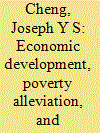

|
|
|
| 8 |
ID:
094931
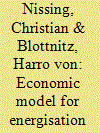

|
|
|
|
|
| Publication |
2010.
|
| Summary/Abstract |
It is widely recognised that access to and supply of modern energy play a key role in poverty alleviation and sustainable development. The emerging concept of energisation seems to capture this idea, and if implemented in its full complexity it should have multiple beneficial effects. To demonstrate this, an economic model is developed for an urban developmental context, drawing on the theory of urban ecosystems and illustrating energy and waste production and consumption issues with current South African data sets. This new understanding of the concept of energisation is then integrated into a local government energy planning process, by means of a checklist for energy planners, covering 18 aspects that between them affect all 7 identifiable tiers of the energy service supply network. A 6-step structured approach is proposed for integrating sustainable energisation into the first four phases of the advanced local energy planning (ALEP) tool.
|
|
|
|
|
|
|
|
|
|
|
|
|
|
|
|
| 9 |
ID:
182491


|
|
|
|
|
| Summary/Abstract |
The Expanded Public Works Programme (EPWP) was developed in South Africa as a strategy for job creation amongst poor people. However, this desired outcome of EPWP is often not achieved. This research follows an action research approach to analyse the potential of two organisations to collectively help overcome development gaps and improve living, learning and working conditions for EPWP participants. A new framework is proposed that will support all collaborating organizations to achieve their common objectives of overcoming poverty and unemployment and providing opportunities in rural areas for vulnerable people to earn an income. The research assesses the opportunities for collaboration between the organizations to help create business opportunities in tourism once participants exit the EPWP programme. This study included some primary data collection and adds new insights to the body of knowledge that deals with effectiveness of EPWP programmes in achieving objectives of poverty alleviation and job creation.
|
|
|
|
|
|
|
|
|
|
|
|
|
|
|
|
| 10 |
ID:
142232


|
|
|
|
|
| Summary/Abstract |
Benchmarking practices have rapidly diffused throughout the globe in recent years. This can be traced to their popularity amongst non-state actors, such as civil society organisations and corporate actors, as well as states and international organisations (IOs). Benchmarks serve to both ‘neutralise’ and ‘universalise’ a range of overlapping normative values and agendas, including freedom of speech, democracy, human development, environmental protection, poverty alleviation, ‘modern’ statehood, and ‘free’ markets. The proliferation of global benchmarks in these key areas amounts to a comprehensive normative vision regarding what various types of transnational actors should look like, what they should value, and how they should behave. While individual benchmarks routinely differ in terms of scope and application, they all share a common foundation, with normative values and agendas being translated into numerical representations through simplification and extrapolation, commensuration, reification, and symbolic judgements. We argue that the power of benchmarks chiefly stems from their capacity to create the appearance of authoritative expertise on the basis of forms of quantification and numerical representation. This politics of numbers paves the way for the exercise of various forms of indirect power, or ‘governance at a distance’, for the purposes of either status quo legitimation or political reform.
|
|
|
|
|
|
|
|
|
|
|
|
|
|
|
|
| 11 |
ID:
090790


|
|
|
|
|
| Publication |
2009.
|
| Summary/Abstract |
This paper analyses whether Grameen Bank's claim of increasing entitlements has any impact on women's capabilities with regard to entering into the marketplace. Achieving capabilities toward entering into the market, deeply related to the issue of gendered power relations, is a significant sign of self-empowerment in rural Bangladesh. The paper also examines wheter micro-loans have been able to improve rural women's well being, critical for empowering women in society where there rights to physical well-being have long been ignored. It further argues that these capabilities are the most important factor for empowering women, and are necessary steps towards establishing gender justice in rural Bangladesh
|
|
|
|
|
|
|
|
|
|
|
|
|
|
|
|
| 12 |
ID:
173783
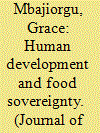

|
|
|
|
|
| Summary/Abstract |
Food security strategies are determined by the prevailing realities within households and communities. Therefore, it is not surprising that in South Africa agricultural transformation is an important food security strategy. This article examines the role of human development and food sovereignty in fostering conditions that enable rural households to enhance their food security capabilities. Using an in-depth analysis of literature, national, regional and international instruments, this article takes its departure from the fact that subsistence agriculture is an effective strategy for improving household food needs when implemented within the broader human rights framework of human development. The results reveal that agriculture has the potential to increase household food security if appropriate agricultural technologies and productive resources such as land are made accessible to households. Further, for agriculture to attain optimal efficiency as a food security strategy, policies on agrarian transformation should be implemented within broader social development programmes.
|
|
|
|
|
|
|
|
|
|
|
|
|
|
|
|
| 13 |
ID:
117138
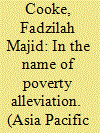

|
|
|
|
|
| Publication |
2012.
|
| Summary/Abstract |
Oil palm in Sabah is grown in large plantations or smallholdings, the latter mostly managed by indigenous peoples on untitled customary land. Government development agencies have long focussed on improving the productivity of smallholders for poverty alleviation. For most smallholders, the main issue is tenure insecurity: as long as lands remain untitled they are subject to changes in land allocation and land use at the discretion of the State Government. Indigenous claimants seek recognition of the right to use and occupy ancestral lands via individual Native Titles (NT), as provided for in the Sabah Land Ordinance (SLO). Recent official push for converting such 'idle' customary lands by promoting large scale joint ventures between customary landowners and oil palm companies is creating anxiety among many indigenous groups. The joint-venture approach has been enabled through a crucial amendment to the SLO that promotes the granting of communal titles (CT) with conditions attached. This tenure instrument empowers state-appointed trustees to make key decisions concerning land use where commercial crops (especially oil palm) are favoured and on the eligibility of descendants (pewaris) to participate in the joint venture or not. The complexity of local concerns and official responses is captured via a case study at Lalampas in the Tongod District of Sabah.
|
|
|
|
|
|
|
|
|
|
|
|
|
|
|
|
| 14 |
ID:
148517
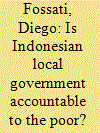

|
|
|
|
|
| Summary/Abstract |
Since decentralization in 2001, Indonesian local governments have acquired a key role in poverty alleviation and social service delivery. The extent to which they have been able to meet this challenge is subject to debate, however, and systematic analysis of policy outcomes remains scarce. This paper contributes to the literature with a study of the district-level implementation of Jamkesmas, Indonesia's free healthcare program for the poor. Using original data on policy implementation, I show that local government is to some extent responsive to the needs of the most vulnerable. In years when local elections (pilkada) are implemented, low-income households are targeted more accurately, suggesting that electoral incentives for local elites may increase access to social services among the poor. However, I also show that the positive effect of local direct elections is limited to districts with electorally competitive politics.
|
|
|
|
|
|
|
|
|
|
|
|
|
|
|
|
| 15 |
ID:
184728
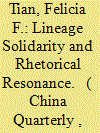

|
|
|
|
|
| Summary/Abstract |
As the state has shifted its priorities towards social harmony and poverty alleviation, this study finds rhetorical resonance, combined with strong lineage solidarity, as an emerging strategy for villages to compete for government resources and investments. By articulating grassroots needs as being in line with local cadres’ performance goals, villages have successfully converted their needs into development proposals and mobilized lineage solidarity to persuade local cadres of the feasibility of such proposals. Drawing on three villages’ school-saving efforts in Fujian province, our fieldwork illustrates how one village retained its school by mobilizing lineage solidarity and converting education into a “model” village project to boost cultural tourism. Others failed to do so and lost their schools. Under the target-based cadre management system, the bottom-up competition for government support is largely shaped by the villages’ pre-existing development and resource structures, which may maximize management efficiency but may also reinforce socioeconomic inequalities between villages.
|
|
|
|
|
|
|
|
|
|
|
|
|
|
|
|
| 16 |
ID:
177444
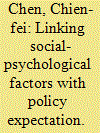

|
|
|
|
|
| Summary/Abstract |
The Chinese government has established a photovoltaics poverty alleviation (PVPA) program to help reduce rural poverty and environmental inequality. However, there is a scarcity of detailed investigations into how social-psychological factors influence the rural poor's decision to adopt solar photovoltaics. The present study examines the local voices of low-income villagers in the Wuhan region towards the PVPA projects from a social-psychological perspective. While focusing on local villagers' opinions before the onset of the COVID-19 pandemic, our findings suggest that villagers' neighbors have the greatest influence on those who subequently adopt solar PV. Similarly, village agents play a crucial role in spreading information and creating a sense of trust, which is different than other countries' solar adoption. The common goals of improving the local community aesthetically, environmentally, and economically also increased villagers' adoption likelihood. These improvements boosted villagers' sense of pride, which, in a virtuous cycle, further encouraged participation in improving the community. Residents' fears were reduced through local social interactions which increased knowledge, such as village-wide technology demonstrations, conversations with local adopters, and town hall discussions with village leaders. However, --- the PVPA projects and skepticism about when or if they would receive promised government subsidies prevented many from adopting. These findings provide valuable implications for policymakers in China and other developing countries who wish to encourage renewable energy adoption after the pandemic.
|
|
|
|
|
|
|
|
|
|
|
|
|
|
|
|
| 17 |
ID:
114876
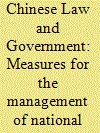

|
|
|
|
|
| Publication |
2012.
|
| Summary/Abstract |
In line with the Outline for Poverty Alleviation and Development in China's RuralAreas (2001-2010), the state has defined 529 counties (including banners, autono-mous counties, and municipal districts) in the central and western regions wherethe tasks of poverty alleviation and development are heavy and poor populationsare relatively concentrated as key counties for national poverty-alleviation anddevelopment work (hereinafter referred to as "key counties"). These Measuresare formulated to promote poverty-alleviation and development work in the keycounties, standardize management, and strengthen supervision.
|
|
|
|
|
|
|
|
|
|
|
|
|
|
|
|
| 18 |
ID:
173793
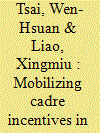

|
|
|
|
|
| Summary/Abstract |
This article discusses the ways in which the Chinese Communist Party (CCP) mobilizes local governments to implement policies set by higher-level governments. Using the concept of ‘institutionalized mobilization’, we discuss poverty alleviation in H county. We identify three key mechanisms: the cross-system leading group, cross-level personnel/financial management, and pairing-up. These mechanisms involve both the adjustment of tiao tiao (条条) and kuai kuai (块块) relationships within the bureaucracy and the strengthening of state–society relations. We also point out the many problems resulting from this mode of institutionalized mobilization. Finally, we compare the political and geographical conditions in H county with those in two other counties – E and K – to ascertain whether the results of poverty alleviation are sustainable.
|
|
|
|
|
|
|
|
|
|
|
|
|
|
|
|
| 19 |
ID:
094892
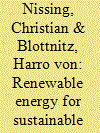

|
|
|
|
|
| Publication |
2010.
|
| Summary/Abstract |
It is widely recognised that access to and supply of modern energy play a key role in poverty alleviation and sustainable development. The emerging concept of energisation seems to capture this idea; however, there is no unified definition at the point of writing. In this paper, the aim is to propose a new and comprehensive definition of the concept of energisation. The chronological development of this concept is investigated by means of a literature review, and a subsequent critique is offered of current definitions and usage of the concept. Building upon these first insights, two planned cases of energisation in post-apartheid South Africa are contrasted to an unplanned one: they are the national electrification programme, the integrated energy centres initiative, and a wood fuelled local economy in Khayelitsha, Cape Town's biggest township. Especially the latter case, based on original data collection by the authors, provides a new understanding of specific elements affecting energisation. Finally, a new and detailed definition of the concept of sustainable energisation is developed by systematically reiterating three key elements: the target group, the concept of energy services, and sustainable development.
|
|
|
|
|
|
|
|
|
|
|
|
|
|
|
|
| 20 |
ID:
076316
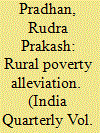

|
|
|
|
|
|
|
|